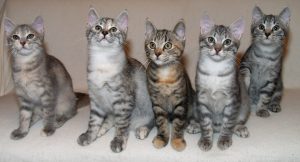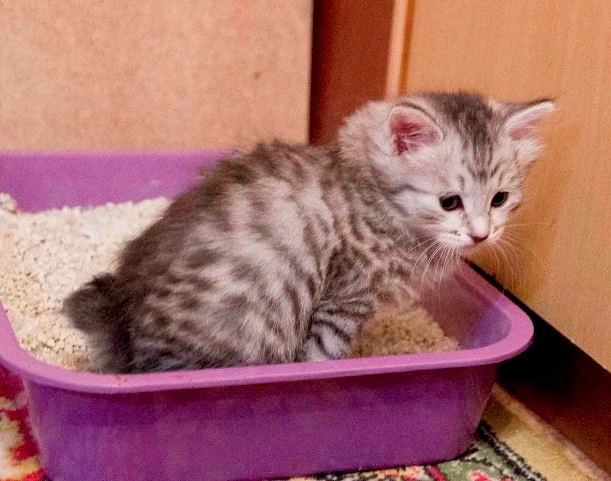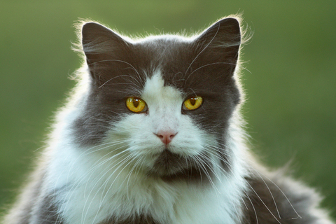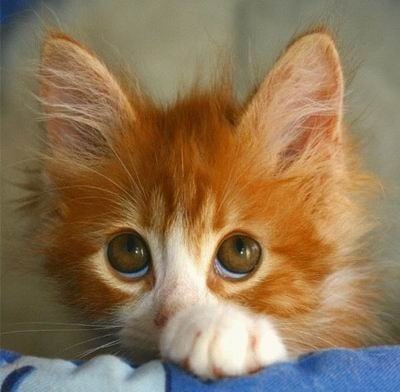European shorthair cat
 There is an opinion that European cats originate from Egyptian cats, which, in due time, were brought by Roman legionaries first to Italy, and from there the cats spread throughout the empire.
There is an opinion that European cats originate from Egyptian cats, which, in due time, were brought by Roman legionaries first to Italy, and from there the cats spread throughout the empire.
In the 10th century, domestic cats were distributed throughout most of Europe and Asia, and were, like their ancestors, shorthair. Subsequently, when cats with long hair began to be taken out of eastern countries, animals with long hair began to appear among short-haired cats. The original color of domestic cats was tiger, in several varieties: mackerel tabby with stripes in the form of fish bones, classic tabby with very beautiful patterns on wool and tabby spotted. In those distant times of the Middle Ages, the European black-colored cats were considered devilish animals and were pursued and destroyed in every way, while cats that have an inverted-m pattern on their heads were considered animals marked with an angel.
The first to engage in the breeding of the European Shorthair were the Swedish, Danish and Norwegian breeders.
In Sweden, in 1946, a domestic cat was registered, which later became known as the European Shorthair.
Later began breeding in England. In their breeding work, English breeders tried to consolidate such signs as: massiveness of animals, round head, round eyes and small ears, very thick underfur. Subsequently, this led to the division into two independent breeds: the European Shorthair and the British, the British still do not recognize the European Shorthair as a separate breed.
The same thing happened with the Americans, who out of ordinary mongrel cats bred their national breed – the American Shorthair. Now in the US there are a lot of nurseries that breed this aboriginal breed.
The first European shorthair cats took part in the first exhibition in Great Britain in 1871. And in 1925, one breeder at a meeting of the British Club proposed that the European Shorthair cat be recognized as an independent breed.
In the UK, this breed was separated from the British only in 1982. Crossbreeding was also forbidden. FIFe recognized the European Shorthair cat as a breed in 1982.
In Prague, at the cat show in 1994, Czech breeders of the European Shorthair managed to establish contacts with French breeders who also worked on this breed. In Europe, EKSHami mainly engaged in the French, Czechs, Italians, Germans.
Yes, and our Moscow lovers and breeders of the EKSH would also very much like their cats to have a “breed”, exhibited at exhibitions, were bred in nurseries. That is why it was possible to admire European short-haired cats at the first Russian exhibitions, but later on in clubs and at exhibitions they became less and less, they were forced out by new imported breeds from abroad. This was also due to the fact that European cats were a fairly accessible breed, and many wanted to be exotic, it was possible to sell kittens with great difficulty, people thought about why to spend money on a kitten, if cats resemble it, and in the basement, and the street outside the house is full. Therefore, thoroughbred Europeans acquired with great reluctance. The breed turned out to be non-commercial, although it is quite expensive to grow kittens and to participate in exhibitions. In this regard, many who were engaged in EKSHami, switched to more fashionable and commercial breeds, which led to a decrease in the number of EKSH.
But not all breeders have abandoned this wonderful and beautiful breed, we have several nurseries in Moscow that deal with this breed (including mine). Our enthusiasts are actively engaged in the exhibition career of their pets, bringing them to the highest titles, thereby promoting the beauty and splendor of their favorites.
Moreover, breeders try to work with rare and most beautiful colors, although this sometimes leads to the fact that in the absence of breeding material, it is necessary to resort to closely related crossing, which is certainly not desirable.
In addition, few Europeans can be seen in the pedigree of all ancestors. In this regard, due to the lack of control over mating, sometimes even the most titled representatives of the European shorthair, undesirable deviations can be transmitted (for example, tail creases, small white spots on the chest or tail in monotonous animals, etc.). Also in the litter of two Europeans, kittens may appear with more elongated hair than the standard requires, at the same time they cannot be counted as either long-haired or semi-long-haired animals (such animals are forbidden to participate in breeding and they are sold as pets on a “pillow”) .
EKSH – one of the most common breeds on our streets. But at cat shows animals of this breed are very few. Breeding them is not an easy and, unfortunately, not always rewarding work.





